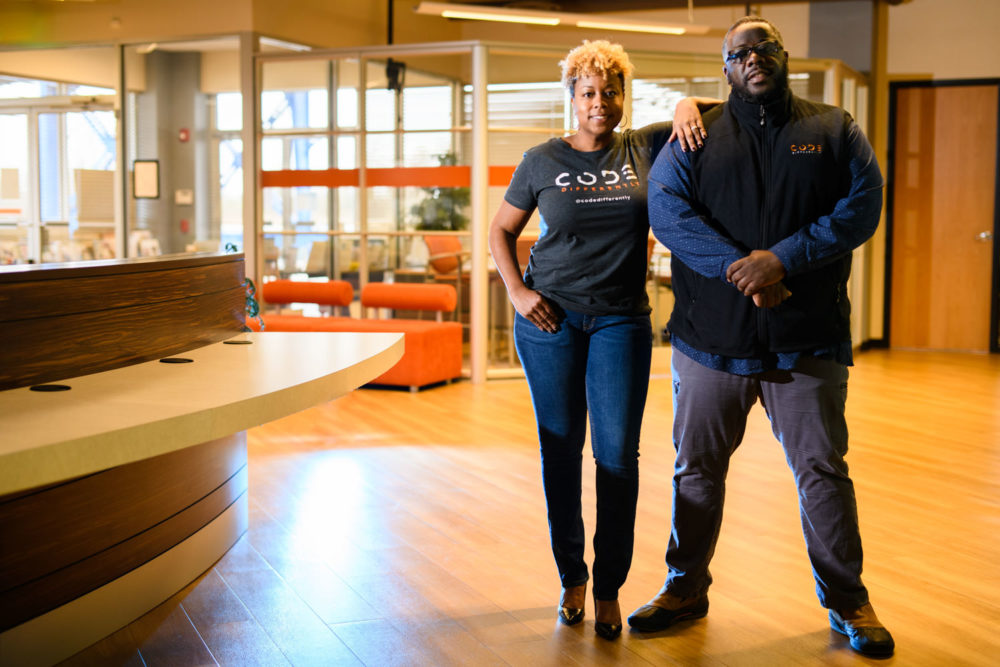Yanique Boreland had always considered college to be the end all and be all.
In order to be successful, she’d been told, you had to go to college. She went to Morgan State University, an HBCU in Maryland, to study computer science. But it wasn’t working out the way she’d hoped.
“I don’t know if was my professors or if it was me — I just wasn’t learning,” she said. “It was mostly men in my class and I didn’t really talk to anybody in there, so it was really just me on my own.”
Then COVID-19 hit and classes shifted to remote, and Boreland’s struggle to keep up got even worse. When her cousin started encouraging her to apply for the Code Differently coding course she’d recently completed, she figured maybe the computer science she had learned to that point might make the 20-week course doable. It was a lot of work, she’d been told, but her cousin was already making great money.
The course — part of Code Differently’s Return Ready program supported by New Castle County CARES Act funds and the Department of Labor — was largely filling its cohorts by word-of-mouth in Delaware’s Black communities. A graduate would land a good job, sometimes tripling their income (or more, depending on how unemployed or underemployed they had been), and tell her cousins, neighbors and friends, along with some advice: It’s not easy, but if you’re willing to work, it’s worth it.
“It’s one of those things where if you build the trust and people start seeing results, they’re like ‘Oh, I’ll try it too,'” Code Differently CEO Stephanie Eldridge told Technical.ly last week, as two current cohorts posed nearby for promotional photos at the organization’s CSC Station location.
Eldridge is particularly proud of these cohorts; they’re made up entirely of women of color, mostly Black women, who are vastly underrepresented in tech.
Code Differently, founded in 2019 by Eldridge and Tariq Hook, has always had a mission to focus on members of the community who, while well-represented or even in the majority in Delaware, are underrepresented in the high-paying industry. Whether it’s via youth, college students or unemployed adults, the founders have been determined to diversify the pipeline and fill those hard-to-fill software developer jobs with people who live in and around Wilmington who have rarely been considered as candidates for such positions.

The women in these cohorts span from college age to over 40. Some are mothers. Some have degrees. Most were strangers when they started, but were maybe a degree separated from classmates.
“My cousin is friends with her cousin, who also went through the program,” Boreland said of classmate Faith Johnson, who was studying health sciences before she decided to apply.
Tuition is free for the program, at least during COVID times. Not only that, students have access to resources such as free child care, Uber passes and gas allowances, distributed on an as-needed basis.
“We try to remove any barriers to education,” Eldridge said.
So far, it’s been working.
“When I first [started the program], I just remember my cousin kept telling me you have to apply yourself,” Johnson said. “I didn’t know how it was going to go or if I was going to be able to finish, because I had it in my head how hard it is. I was definitely scared. But now I know for a fact that I’m going to finish, and I’m more confident as we go in what I’m learning, so I don’t really have that fear anymore.”
Another student, DeShawn Wallace, who is in a different (but simultaneous) cohort from Boreland and Johnson, has a bachelor’s degree it exercise science but hasn’t been able to find a job in the industry.
Being surrounded by people that look like me, it just makes it easier to relate.
In her case, it was social media that made her aware of the Code Differently opportunity.
“I came across one of my friends on Instagram, she actually posted this program, so I looked through it and saw it was about technology,” Wallace said. “I did have an interest in technology, but I didn’t have a real path to take [in tech], so I decided to sign up.”
All of them feel that being surrounded by other Black women in their cohorts has been beneficial.
“I felt like I was coming in not really knowing much of anything,” Boreland said. “But once I got here, just the vibe, the energy from everybody I talked to, I knew it was going to be a good experience.”
Johnson agreed: “I feel like, if anything, it’s the reason that I keep doing it,” she said. “Being surrounded by people that look like me, it just makes it easier to relate.”
With half or more of the cohort left to go, the students are concentrating more on learning in the moment than where, exactly, they’ll go, though Johnson would like to use her new tech skills in the healthcare field, and Wallace would like for them to enhance her fitness degree. Boreland has always wanted to work in the video game industry.
Wherever they land, if they complete the program as planned, they know there is 94% hire rate for the program.
“When college wasn’t working out, it was like, what am I supposed to do now? I don’t have anything else to do,” Boreland said. “Now I have this whole different outlook on what I thought it was going to be.







